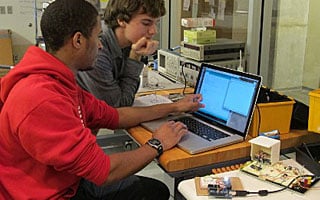A team of 19 Johns Hopkins undergraduate students — including 10 in biomedical engineering — has been selected as one of 10 finalists for the $10 million Qualcomm Tricorder XPRIZE. Their team, Aezon, developed a prototype that monitors a user’s vitals, immediately analyzes their symptoms, and rapidly screen for diseases and infections. It ultimately will offer a seamless way to track health and a potential solution to the bottleneck in health care access.
The Qualcomm Tricorder XPRIZE is a 3.5-year global competition sponsored by the Qualcomm Foundation for teams to develop a consumer-focused mobile device capable of diagnosing and interpreting a set of 15 medical conditions and capturing five vital health metrics.
The Johns Hopkins undergraduate team has brought a fresh and creative approach to the competition — emerging from a field of over 300 teams from around the world. After two years of intensive research, design, and development, the Aezon prototype tricorder diagnostic system integrates a vitals monitoring unit, lab box, smartphone app, and cloud database that together offer users a seamless way to track their health. The system screens for diseases ranging from streptococcal pharyngitis (strep throat) to urinary tract infection (UTI) and then advises users about how to proceed. An online cloud securely stores the data and test results, which are then accessible by both users and their physicians via an online portal.
BME students on the Aezon team include Tatiana Rypinski (team leader), George Chen, Neil Rens, Ryan Walter, Ivan Kuznetsov, Andrew Mao, Stephanie Hao, Alex Kearns, April Lo, and Karthik Chellamuthu. The team is ecstatic about being selected as finalists. “This is an amazing opportunity and we couldn’t be more thrilled. We are grateful to all our mentors within the Hopkins community who have helped us get here,” commented Rypinski.
BME’s Ryan Walter stated, “In making this project we have all had to wear many hats. Everything from programming to modeling, circuitry to user-friendliness, we have had to switch positions frequently and continually. While busying, this also allows us a lot of exposure in the many fields behind creating a medical device.”
When asked about the importance and potential impact of this project, Neil Rens shared, “This technology has the potential to alleviate some of the burden on the health care industry. In the U.S., population growth is outpacing the training of new health care professionals. Developing countries face even more challenging circumstances and have startling shortages of clinicians. With a medical tricorder, diagnosis can take place without a health care professional, allowing clinicians to focus on actually treating patients rather than running numerous (and often too many) tests to check for every possible disease.”
The final round of Xprize judging is slated to take place in mid-to-late 2015 with the submission of 30 devices for consumer testing. The final judging and awards ceremony will take place in early 2016.

